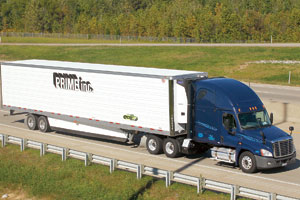Prime Agrees to Pay $3.11 Million to Settle EEOC Case

This story appears in the June 6 print edition of Transport Topics.
Truckload carrier Prime Inc. concluded its 15-year legal battle with the U.S. Equal Employment Opportunity Commission by agreeing to pay more than $3.11 million in compensatory damages and back pay in a civil case concerning driver training and allegations of sexual harassment.
Both parties announced the conclusion of the litigation in press releases May 31, with the federal agency hailing a consent decree that results in, “Women who were denied jobs will now be compensated and have the opportunity to be hired,” EEOC General Counsel David Lopez said.
Prime called the document a “settlement” and the result of an August 2014 U.S. District Court decision that “disagreed with Prime’s interpretation” of Title VII of the Civil Rights Act of 1964.
The agreement by the two parties derailed a jury trial that was supposed to start in January. The case was concluded with a May 26 order from Judge M. Douglas Harpool of the district court’s Springfield, Missouri, division.
While this case was filed in 2011, the issue started in 2001. Prime was sued that year by three women alleging sexual harassment when they were driver trainees, with the harassment coming from men who were driver trainers for Prime, which ranks No. 21 on the Transport Topics Top 100 list of largest for-hire carriers.
As a result, Prime changed its training program in 2004 so that men trained men and women trained women. The company said same-sex training was a legitimate exception to Title VII because of the unique nature of longhaul trucking.
Longhaul “is not like any other industry when it comes to training drivers,” Prime’s Brooke Mosley said. “Prime considered factors unique to the trucking industry and to the circumstances of trainers and trainees in an over-the-road training environment, such as being on the road for weeks at a time … spending extended periods of time in the confined space of a truck cab; living on the truck; changing clothes on the truck; sleeping on the truck; and, in some instances, using portable toilets on the truck.”
Mosley is a training specialist and the female driver liaison for Prime.
EEOC filed a second suit against Prime in 2011 saying there were so few female driver trainers available, women had “to wait extended periods of time, sometimes up to 18 months, for a female trainer to become available, which resulted in most female driver trainees being denied employment,” the agency said.
Harpool’s order adopted and rejected reasoning from both sides in coming to a conclusion.
“Although the court rejected Prime’s bona fide occupational qualification defense, the court declined to issue a finding as to whether Prime enacted the same-gender training policy — misguided as it was — based on evil or malicious motive; instead, the court ruled Prime’s motive was a disputed issue of material fact and declined to award punitive damages as a matter of law,” the order said.
The statement from Prime quoted Ellen Voie, president of the Women in Trucking association, as offering support.
“It was reasonable for Prime to implement a same-gender training policy for the safety and privacy of trainees,” she said.
Prime said it “respectfully disagreed with the court’s ruling” on same-gender training but accepted the ruling and abandoned the training policy.
The lack of proof on malice was a critical piece of Harpool’s order. He rejected several requests by EEOC because of lack of malice.
EEOC asked for the appointment of an outside monitor to report on compliance with the court order and an order for Prime to post employment law notices. The first part was rejected because of the lack of proof on malice, and the second was denied because similar notices already are found on Prime’s online applications.
Harpool concluded his order with three specific points:
• Prime must not discriminate against applicants or employees on the basis of gender.
• Prime may not implement another same-sex training policy, or any similar practice that would create “barriers to entry or advancement.”
• By June 25, the company must send letters to all of the women who claimed discrimination and be invited to apply for employment as a driver or driver trainee. Furthermore, they shall be given priority hiring consideration over other applicants and if hired be made immediately eligible for health, dental, insurance and retirement benefits.
Prime broke out the monetary aspect as $1.74 million in compensatory damages to 63 claimants represented by EEOC and $1.13 million in back pay, much of it already paid out. EEOC also listed $250,000 for Deanna Roberts Clouse, who was the lead plaintiff in the 2011 suit.
Prime said that since April 2013 its training policy has been first come, first served, in matching trainers with trainees, regardless of gender. There is an exception, though, if a trainer or trainee submits a “legitimate objection based on religion, family considerations or other concerns that are evaluated on a case-by-base basis.”

